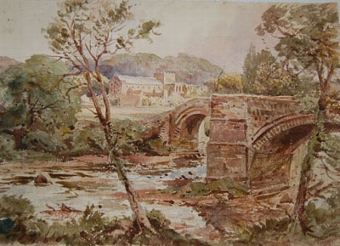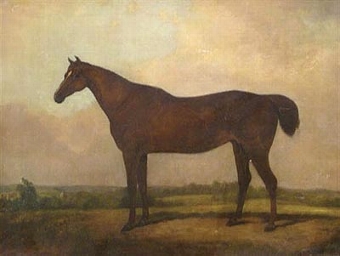featured item
portrait of charles james fox 1749 -1806
- View other items in:
- antiques interior design modern and vintage
- other interior design
artware ltd
Enquire about this antique
Artware Ltd has 565 antiques for sale.
click here to see them all
Charles James Fox was born on 24 January 1749 and was the third son of Henry Fox, first Lord Holland and his wife Lady Caroline Lennox, daughter of the second Duke of Richmond. This made Fox the nephew of the third Duke of Richmond, a leading Rockingham Whig peer. Fox was educated at Eton and Hertford College, Oxford. His father exerted little control over Fox and encouraged him to be extravagant and dissolute. Fox lost vast sums at gambling, and in 1774 Lord Holland paid his son''s gambling debts at a cost of ?140,000. Almost 20 years later political friends paid off Fox''s debts and gave him a comfortable income. Fox subsequently gave up both racing and gambling. Fox was Falstaffian in character and none too clean in appearance. He was openly a rake and there were rumours that he was conducting an affair with Georgiana, Duchess of Devonshire.#LINEBRK##LINEBRK#In 1768 he became MP for Midhurst, a family pocket borough. He was only 20 years old and MPs could not take their seats until they were 21, so he was under the legal age to sit in parliament. Fox immediately attracted attention through his ability and the quality of his speeches. In 1770 he was appointed as a junior Lord of the Admiralty but resigned in 1772 so that he could oppose the legislation that became the Royal Marriages Act in the same year. In December 1773 he became a junior Lord of the Treasury but the king, who disliked Fox for opposing the Royal Marriages Act, dismissed him in February 1774.#LINEBRK##LINEBRK#Edmund Burke and Fox became friends and, because his uncle was a Rockinghamite, Fox was drawn to the Rockinghamites and opposed North''s American policy although he knew that the American war was popular in England. When North resigned in March 1782, Rockingham formed his second ministry. He appointed Lord Shelburne as Home Secretary and Fox became the foreign secretary. Fox thought that the negotiations for peace with the Americans came within his jurisdiction and wanted to recognise the independence of the colonies immediately. Shelburne wanted to wait until the peace treaties with the Europe were ready for signature. Fox announced on 30 June that he was going to resign but before he could do it, Rockingham died on 1 July. #LINEBRK##LINEBRK#Shelburne was appointed as the new PM and Fox and his political allies refused to serve with Shelburne although other Rockinghamites did serve in the new ministry. However, the ministry was not strong and had to face attacks from both Fox and Lord North. On 14 February 1783 the two men negotiated terms by which they would overthrow the government, with the Duke of Portland as the new PM. . The king tried for five weeks to avoid appointing what he called ''the most unprincipled coalition the annals of this or any other nation can equal'', but he had to give in and the Fox-North coalition took office on 2 April 2 1783. The King refused to give the ministers any marks of royal confidence but the ministry was able to maintain the support of the independent country gentlemen in the House of Common. Fox did not help his precarious position at court by proposing to give his dear friend, the Prince of Wales, an income of ?100,000 a year. This made Fox even more unpopular with the King. #LINEBRK##LINEBRK#The Fox-North coalition was brought down by the proposed India Bill. On 17 December, the House of Lords rejected the Bill after the King had made it known that he would consider as an enemy anyone who voted for it. The coalition was dismissed next day, and William Pitt accepted an invitation to form a government. Fox alienated many of his supporters by attacking Pitt at every opportunity and they showed their discontent by changing sides. In March 1784 Pitt called a general election. After the results were announced, the opposition found itself with only about 145 members in the new House of Commons. Those who lost their seats became known as Fox''s Martyrs. Fox was re-elected for Westminster, defeating the ministerial candidate. #LINEBRK##LINEBRK#Fox could have joined William Pitt''s government in 1784 but his attacks on Pitt''s proposed commercial concessions to Ireland in 1785 and on a commercial treaty made with France in 1787 damaged his reputation. He made a further error of judgement in 1788-89, when the King was temporarily insane, by supporting the claim of the Prince of Wales to the regency as a right, whereas Pitt maintained that Parliament alone had the right and competence to appoint a regent. This was a total role reversal for both men, since Fox as a Whig supported parliamentary supremacy and Pitt as a Tory was in favour of royal prerogative. #LINEBRK##LINEBRK#In 1792 Fox was responsible for the passing of the Libel Act which restored the right of juries to decide whether an allegedly libellous article had been published, what constituted libel and whether or not a defendant was guilty of libel. The next year, Fox welcomed the outbreak of the French Revolution in 1789 and continued to praise the French achievement even after war with Revolutionary France had broke out in 1793. His support of the French Revolution brought his friendship with Edmund Burke to a dramatic and very public end. However, a large part of the opposition went over to the government in 1794. The minority of between 50 and 60 MPs who continued to support Fox became one of the weakest oppositions ever known in England, and in about 1797 many opposition members even ceased to attend Parliament. On one occasion, the entire parliamentary opposition went home in the same cab.#LINEBRK##LINEBRK#Fox approved of the Peace of Amiens that was signed in 1802 but spoke of the shameful surrender of all our conquests to Napoleon. He was critical of Henry Addington''s ministry for its failure either to maintain the peace or to put the country into an adequate state of defence to meet the threat of invasion after the resumption of the war in 1803. Addington''s government resigned a few days later and Pitt returned to office.#LINEBRK##LINEBRK#Pitt wanted to form a broad-based coalition but was unable to persuade George III to accept Fox as foreign secretary. Fox said that he was too old at 55 to care about office but advised his friends to join Pitt''s ministry. They rejected the suggestion and went into opposition. When Lord Grenville became prime minister after Pitt''s death the King accepted Fox''s appointment as foreign secretary. By this time Fox''s health was breaking down and he made his last speech in Parliament on 19 June 1806. One of the last things Fox did was to pledge to abolish the slave trade. Fox died on 13 September in the Duke of Devonshire''s house in London. He was buried in Westminster Abbey by the side of his political arch-enemy, Pitt.
Antiques.co.uk Ref: A5HNTYD3
- Materials:
- Oil on Canvas
Artware Ltd
Artware Fine Art specialises in fine antique, decorative and historical portraits and topographical pictures . We cover a period from the 17th and 18th centuries through to the 19th & 20th Centuries. We have over 150 portraits in stock, which can be viewed on our web site, each historical portrait has well researched biographical information both on the sitter and the artist.
Contact details
18 La gare
51 Surrey row
London
Greater London
SE1 0BZ
UNITED KINGDOM
T: 0207 921 97904
E: greg@artwarefineart.com
W: www.artwarefineart.com











